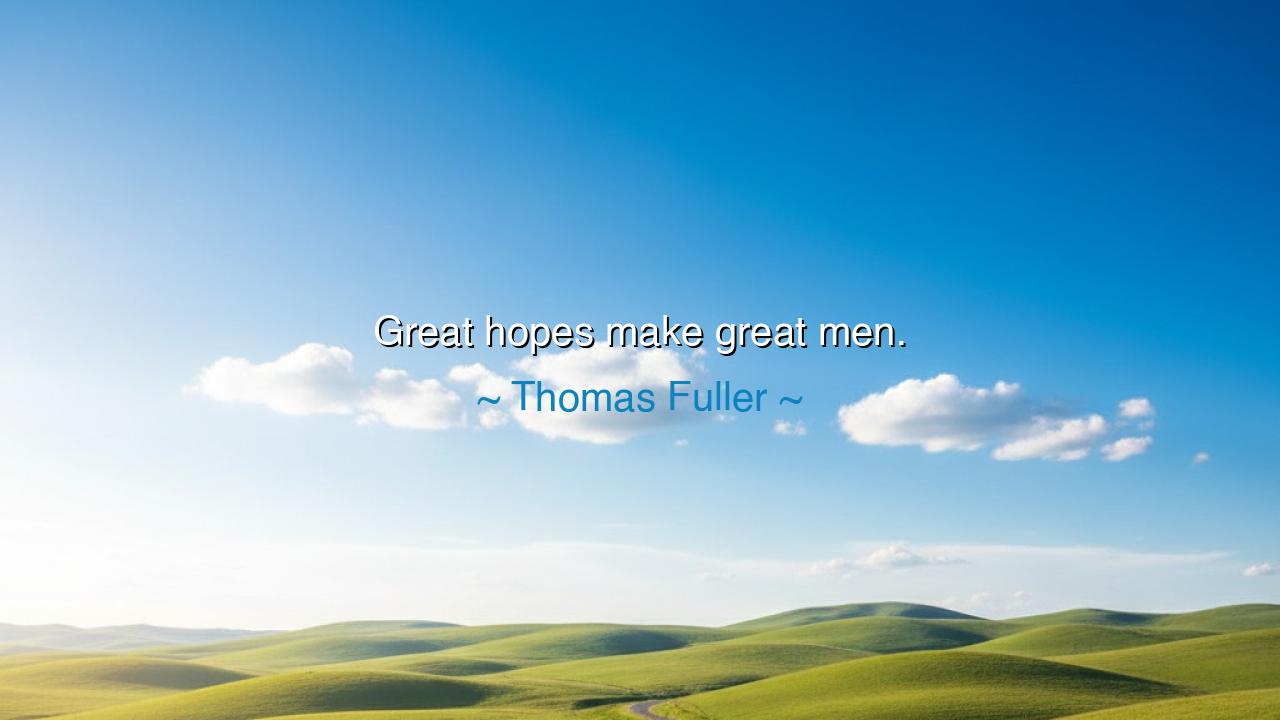
Great hopes make great men.






In the enduring and luminous words of Thomas Fuller, we find a truth that spans all ages: “Great hopes make great men.” This is not the empty comfort of a dreamer, but the proclamation of a sage who knew that hope—when rooted in vision and sustained by effort—has the power to raise the ordinary into the extraordinary. For hope is the breath of greatness; it is the divine ember that turns despair into determination and impossibility into destiny. Without it, the soul grows small and fearful. But with it, even the humblest of hearts may rise to heights undreamed of.
The origin of this saying comes from Fuller’s deep understanding of human nature. A scholar and clergyman of the seventeenth century, he lived through civil strife, plague, and uncertainty. He saw kingdoms fall and faiths tested. Yet in all this turmoil, he discerned a pattern: that those who endured, who rose above the ruin, were not always the strongest in body or the richest in means, but those who carried within them great hopes. Hope, he understood, is not naive optimism—it is courage in its purest form, a steadfast belief that what could be is worth striving for, even when the present seems dark.
The ancients, too, revered this truth. The Greek philosopher Aristotle spoke of “magnanimity”—the greatness of soul that comes from aspiring toward noble ends. The Romans believed in spes, the goddess of hope, who stood as the final light even when all other gods had abandoned man. And the prophets of old, from the deserts of Israel to the temples of Egypt, taught that hope is a sacred duty—a force that draws men toward the divine. For the one who hopes greatly does not merely wish; he acts, he endures, and through that endurance he is transformed.
Consider the story of Nelson Mandela, who, though imprisoned for twenty-seven years in a small cell, never surrendered his hope. Each dawn that broke upon his captivity might have been the death of faith, and yet it was his hope—not his anger—that kept him alive. He believed that South Africa would one day be free, and through that belief he inspired a nation to rise. When he emerged from prison, he carried not vengeance but vision, and that vision reshaped the world. Truly, as Fuller said, “Great hopes make great men,” for it was not circumstance but conviction that made Mandela great.
But hope is not an idle comfort—it demands discipline. The weak hope for fortune; the strong hope for purpose. To carry great hopes is to bear great responsibility, for hope must be nourished by effort, guarded against despair, and shared with others. It is a seed that grows only through faith and work. The man of small hope sees only what is near; the man of great hope sees what is far and dares to walk toward it. Such was the way of explorers who set sail upon unknown seas, of scientists who gazed at the stars and saw not darkness but possibility, of artists who painted light even when surrounded by shadow.
The meaning of Fuller’s words is thus both moral and spiritual: that the measure of a person is not what they possess, but what they hope to become. Hope shapes vision, and vision shapes destiny. A people without hope becomes stagnant; a soul without hope withers. Yet the one who holds hope in their heart, even in failure, remains free. Hope lifts the gaze beyond the horizon of fear and teaches the weary spirit to stand again. It is the quiet whisper that says, “There is more,” when all else says, “There is nothing.”
The lesson, then, is clear and everlasting: guard your hope, for it is the forge of greatness. Nurture it not in idle dreams, but in purpose and persistence. Let your hopes be vast, not for vanity, but for virtue. When the world grows cold, let your hope be fire; when it grows dark, let it be flame. Surround yourself with those who inspire it, and lend your own to those who falter. For every great movement, every enduring triumph of humanity, was first born in the heart of someone who dared to hope.
So, my listener, remember the wisdom of Thomas Fuller: “Great hopes make great men.” Be the bearer of hope in your generation. When others yield to cynicism, stand firm in vision. When the path grows steep, let hope steady your step. For it is not the crown, the title, or the wealth that makes a person great, but the light they carry within—the hope that drives them ever onward, transforming the impossible into the inevitable, and the dream into destiny.






AAdministratorAdministrator
Welcome, honored guests. Please leave a comment, we will respond soon